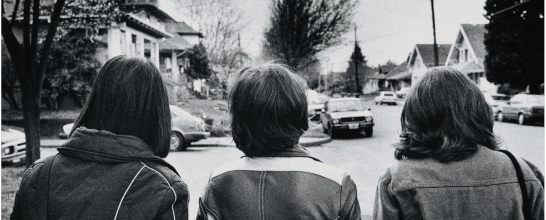Impulse Noise: The importance of the Sleater-Kinney reunion

I don’t have a degree in gender studies. I don’t claim to have mastered feminist theory in any way. And I never was never exposed to feminism when I was a kid. From a young age, I felt pretty certain that a woman’s place in the world was to look pretty and take care of a family. And yet, from that same young age, I knew I didn’t want either of those things.
Like many of you reading this probably did, I came to define myself through music as I grew up. And for many years, the music that defined me was goth, punk and new wave. I could recite Bauhaus lyrics on cue. Robert Smith was something of an idol. And while the occasional Tori Amos CD crept its way into my music collection, it was men like Ian Curtis who helped me figure out who I was. Siouxsie Sioux was really the only woman I paid attention to, and (sadly) my appreciation for her at the time never moved beyond surface aesthetics. After all, that’s what women are for, right?
Music nerds such as myself love to ruminate on the album that ‘changed their life’ (we’ve even broached the subject here). Often, that manifests itself as a group of white males sitting around talking about discovering Blur while all their friends were listening to Sugar Ray and Everclear. And while I don’t dismiss the impact that that Blur album may have had on a high schooler in the ‘burbs, it wouldn’t be hyperbolic to say that The Hot Rock really did change my life.
It was towards the end of my junior year when my best friend gave me the tape that would change everything. Handing out mixes wasn’t out of character for him; like me, he was obsessed with music. Unlike me, his tastes and knowledge were vast. Sunny Day Real Estate next to DJ Shadow. The Roots and Elliott Smith commingling in harmony. The mixes, though rarely prompted by a special occasion, were always something to look forward to. So naturally, I popped it into my tape deck as soon as I got home.
I can’t recall how far it was into the mix when “God is a Number” came on, but as soon as it did, I was transfixed. Everything else on that tape faded away. I rewound it over and over just to listen to that song. Within days, I went out and picked up The Hot Rock. Within weeks, Dig Me Out was on constant rotation in my car. By the time One Beat came out, I was scouring tour schedules, buying t-shirts and reading every Spin interview I could get my hands on.
I’m not going to wax on about Sleater-Kinney’s role in musical history, because you can already read about that in plenty of places. But as the band sits on the precipice of a full-blown reunion, with an international tour and new album release in the new year, I do think it’s worth reflecting on why this reunion carries so much significance, not for the music world but for the broader culture.
We’re at an age when the media asks pop stars whether or not they consider themselves feminists, and those pop stars are weighing what effect being a “feminist” would have on their careers. I never had to ask Sleater-Kinney if they were feminists. In fact, I didn’t care. While their early albums are pretty unmistakably riot grrrl and rife with gender issue lyrics, those weren’t the ones that spoke to me the most. They got through to me with the subtlest words and with monstrous beats and riffs. They were strong women with no pretense, no glossy packaging, no one pulling their strings. To hear Corin belt out “Words and guitar, I want it. Words and guitar, I got it,” there was no mistaking the power in these women’s hands and voices. A song like “Words and Guitar” has no overt gender message, and yet is unmistakably empowering. While “Little Babies” told me what I already knew, it was songs like “Get Up” that told me what I still needed to hear.
From Sleater-Kinney, I discovered PJ Harvey, Kate Bush, and countless others that had escaped my interest in my younger years. Even good old Siouxsie Sioux took on entirely different dimensions for me.
That’s why we need Sleater-Kinney now more than ever. The skeptics may deride this reunion as 90s nostalgia for 30- and 40-somethings, or worse yet, assume that it’s the band members capitalizing on their cult status and the success of Portlandia to make a few bucks. I, myself, have derided the Pixies reunion as pointless because the band’s just in it for the money. (Frank Black has more or less admitted so.)
Whatever has motivated them to get back together, it couldn’t come at a better time. It’s nearly 2015, and we still have male politicians making decisions about our birth control. We have GamerGate. Just today, I felt sick as I watched Hollaback’s video of a woman receiving more than 100 catcalls over the course of one day simply for walking down the sidewalk while female (and then, of course, there was the internet fallout to this video, which included rape and death threats towards the woman in the comments on the video). With all this, you could easily believe that feminism never even happened.
We have plenty of reasons for 17-year-old girls out there to still believe that they can’t be strong. So at the end of the day, if one 17-year-old girl picks up one of their albums as a result of this reunion, it will all have been totally worth it.
You might also like:




